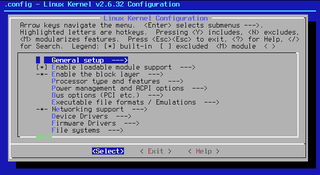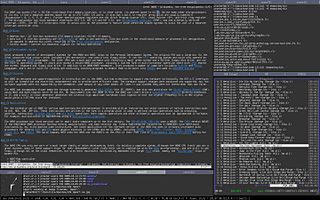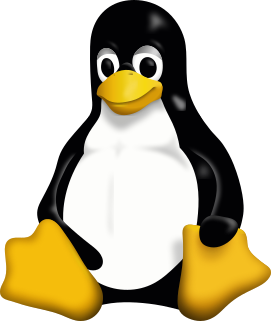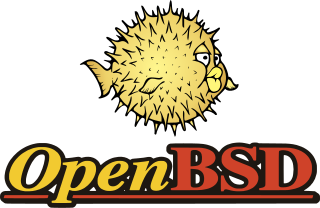
Cygwin is a POSIX-compatible environment that runs natively on Microsoft Windows. Its goal is to allow programs of Unix-like systems to be recompiled and run natively on Windows with minimal source code modifications by providing them with the same underlying POSIX API they would expect in those systems.
The editor war is the rivalry between users of the Emacs and vi text editors. The rivalry has become a lasting part of hacker culture and the free software community.

GNU is an operating system and an extensive collection of computer software. GNU is composed wholly of free software, most of which is licensed under the GNU Project's own General Public License (GPL).

GnuCash is an accounting program that implements a double-entry bookkeeping system. It was initially aimed at developing capabilities similar to Intuit, Inc.'s Quicken application, but also has features for small business accounting. Recent development has been focused on adapting to modern desktop support-library requirements.

ncurses is a programming library providing an application programming interface (API) that allows the programmer to write text-based user interfaces in a terminal-independent manner. It is a toolkit for developing "GUI-like" application software that runs under a terminal emulator. It also optimizes screen changes, in order to reduce the latency experienced when using remote shells.

vi is a screen-oriented text editor originally created for the Unix operating system. The portable subset of the behavior of vi and programs based on it, and the ex editor language supported within these programs, is described by the Single Unix Specification and POSIX.

XEmacs is a graphical- and console-based text editor which runs on almost any Unix-like operating system as well as Microsoft Windows. XEmacs is a fork, based on a version of GNU Emacs from the late 1980s. Any user can download, use, and modify XEmacs as free software available under the GNU General Public License version 2 or any later version.
Almquist shell is a lightweight Unix shell originally written by Kenneth Almquist in the late 1980s. Initially a clone of the System V.4 variant of the Bourne shell, it replaced the original Bourne shell in the BSD versions of Unix released in the early 1990s.

The GNU Project is a free-software, mass-collaboration project, first announced on September 27, 1983 by Richard Stallman at MIT. Its aim is to give computer users freedom and control in their use of their computers and computing devices, by collaboratively developing and providing software that is based on the following freedom rights: users are free to run the software, share it, study it and modify it. GNU software guarantees these freedom-rights legally, and is therefore free software; the use of the word "free" always being taken to refer to freedom.

In Unix computing, Ion is a tiling and tabbing window manager for the X Window System. It is designed such that it is possible to manage windows using only a keyboard, without needing a mouse. It is the successor of PWM and is written by the same author, Tuomo Valkonen. Since the first release of Ion in the summer 2000, similar alternative window management ideas have begun to show in other new window managers: Larswm, ratpoison, StumpWM, wmii, xmonad and dwm.
The GNU Core Utilities or coreutils is a package of GNU software containing reimplementations for many of the basic tools, such as cat, ls, and rm, which are used on Unix-like operating systems.

MicroEMACS is a small, portable Emacs-like text editor originally written by Dave Conroy in 1985, and further developed by Daniel M. Lawrence (1958–2010) and was maintained by him. MicroEMACS has been ported to many operating systems, including CP/M, MS-DOS, Microsoft Windows, VAX/VMS, Atari ST, AmigaOS and various Unix-like operating systems.
Ports collections are the sets of makefiles and patches provided by the BSD-based operating systems, FreeBSD, NetBSD, and OpenBSD, as a simple method of installing software or creating binary packages. They are usually the base of a package management system, with ports handling package creation and additional tools managing package removal, upgrade, and other tasks. In addition to the BSDs, a few Linux distributions have implemented similar infrastructure, including Gentoo's Portage, Arch's Arch Build System (ABS), CRUX's Ports and Void Linux's Templates.

GNU Oleo is a lightweight free software spreadsheet originally designed as a text-based spreadsheet using the curses library. The last development version of Oleo, 1.99.16, was released in 2001.

The Tanenbaum–Torvalds debate was a debate between Andrew S. Tanenbaum and Linus Torvalds, regarding the Linux kernel and kernel architecture in general. Tanenbaum began the debate in 1992 on the Usenet discussion group comp.os.minix, arguing that microkernels are superior to monolithic kernels and therefore Linux was, even in 1992, obsolete. Linux kernel developers Peter MacDonald, David S. Miller and Theodore Ts'o also joined the debate.

JOVE is an open-source, Emacs-like text editor, primarily intended for Unix-like operating systems. It also supports MS-DOS and Microsoft Windows. JOVE was inspired by Gosling Emacs but is much smaller and simpler, lacking Mocklisp. It was originally created in 1983 by Jonathan Payne while at Lincoln-Sudbury Regional High School in Massachusetts, United States on a PDP-11 minicomputer. JOVE was distributed with several releases of BSD Unix, including 2.9BSD, 4.3BSD-Reno and 4.4BSD-Lite2.
GNU variants are operating systems based upon the GNU operating system. According to the GNU project and others, these also include most operating systems using the Linux kernel and a few others using BSD-based kernels.

GNU Emacs is the most popular and most ported Emacs text editor. It was created by GNU Project founder Richard Stallman. In common with other varieties of Emacs, GNU Emacs is extensible using a Turing complete programming language. GNU Emacs has been called "the most powerful text editor available today". With proper support from the underlying system, GNU Emacs is able to display files in multiple character sets, and has been able to simultaneously display most human languages since at least 1999. Throughout its history, GNU Emacs has been a central component of the GNU project, and a flagship of the free software movement. GNU Emacs is sometimes abbreviated as GNUMACS, especially to differentiate it from other EMACS variants. The tag line for GNU Emacs is "the extensible self-documenting text editor".

Emacsor EMACS is a family of text editors that are characterized by their extensibility. The manual for the most widely used variant, GNU Emacs, describes it as "the extensible, customizable, self-documenting, real-time display editor". Development of the first Emacs began in the mid-1970s, and work on its direct descendant, GNU Emacs, continues actively as of 2019.


















